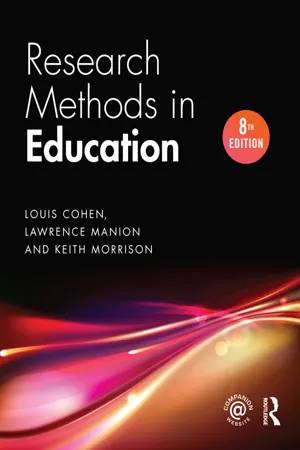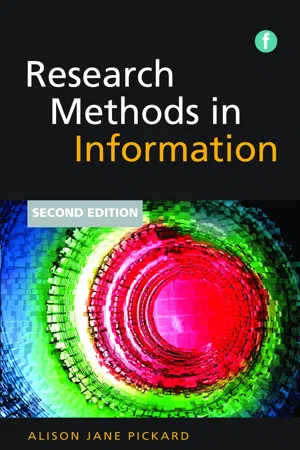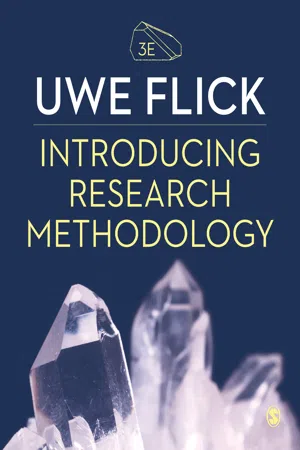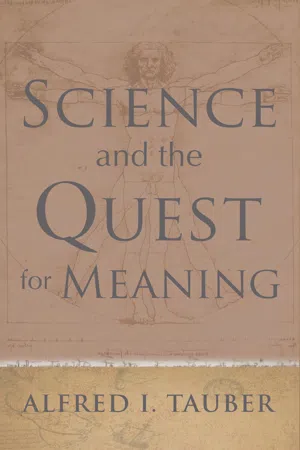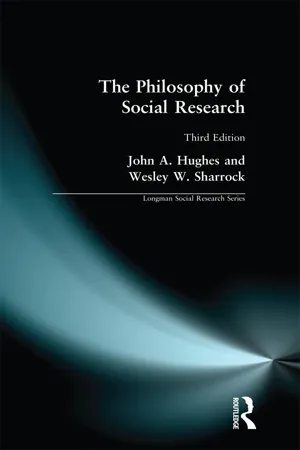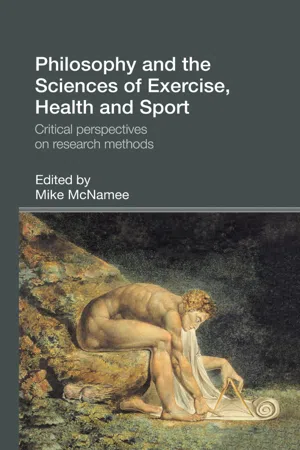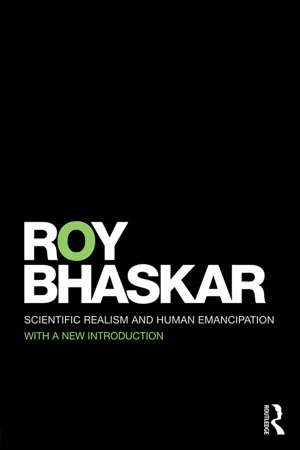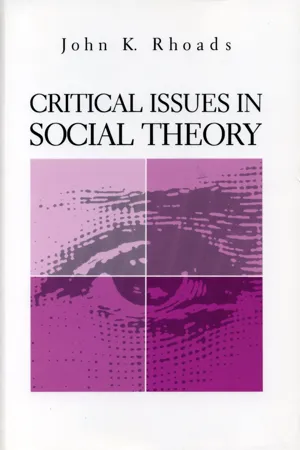Social Sciences
Positivism and Interpretivism
Positivism and interpretivism are two contrasting approaches in social sciences. Positivism emphasizes the use of scientific methods and empirical evidence to study social phenomena, aiming for objectivity and generalizability. In contrast, interpretivism focuses on understanding the subjective meanings and interpretations of individuals, often using qualitative methods to explore the complexities of human behavior and social interactions.
Written by Perlego with AI-assistance
Related key terms
1 of 5
10 Key excerpts on "Positivism and Interpretivism"
- eBook - ePub
- Louis Cohen, Lawrence Manion, Keith Morrison(Authors)
- 2017(Publication Date)
- Routledge(Publisher)
With its emphasis on observational evidence and the scientific method, positivism accords significance to sensory experience (empiricism), observational description (e.g. ruling our inferences about actors’ intentions, thoughts or attitudes), operationalism, ‘methodical control’, measurement, hypothesis testing and replicability through the specification of explicit and transparent procedures for conducting research (Hammersley, 2013, pp. 23–4). Hammersley notes that the terms ‘positivism’ and ‘empiricism’ are often regarded as synonymous with each other (p. 23), but to equate positivism simply with quantitative approaches is misguided, as qualitative data are equally well embraced within empiricism. Indeed he notes that ethnographers and discourse analysts rely on careful observational data (pp. 24–5).Though the term positivism is used by philosophers and social scientists, a residual meaning derives from an acceptance of natural science as the paradigm of human knowledge (Duncan, 1968). This includes the following connected suppositions, identified by Giddens (1975). First, the methodological procedures of natural science may be directly applied to the social sciences. Positivism here implies a particular stance concerning the social scientist as an observer of social reality. Second, the end-product of investigations by social scientists can be formulated in terms parallel to those of natural science. This means that their analyses must be expressed in laws or law-like generalizations of the same kind that have been established in relation to natural phenomena. Positivism claims that science provides us with the clearest possible ideal of knowledge.Where positivism is less successful, however, is in its application to the study of human behaviour, where the immense complexity of human nature and the elusive and intangible quality of social phenomena contrast strikingly with the order and regularity of the natural world. This point is apparent in the contexts of classrooms and schools where the problems of teaching, learning and human interaction present the positivistic researcher with a mammoth challenge. - eBook - PDF
- Alison Jane Pickard(Author)
- 2017(Publication Date)
- Facet Publishing(Publisher)
I would also like to provide a very brief history of each paradigm for context. These are potted his-tories that do little more than provide you with an outline of the development. Table 1.1 provides an overview of the contrasting basic beliefs of each of the three paradigms. Positivist research Brief history There are three generations of positivist thinkers who have influenced and shaped the paradigm as it is today: the original formulation of positivism attributed to Auguste Comte, the logical positivism associated with the Vienna Circle, and finally the stan-dard positivism developed in the mid-20th century (Outhwaite, 1987). In the early 19th century Auguste Comte devised social positivism as a means of examining social phenomena as an empirical science as opposed to the theological and metaphysical philosophies that dominated at the time. Positive knowledge was the dis-covery of causal laws of phenomena derived directly from observation. This was a rejection of the notion that society was beyond our physical perception and could not be examined in the same way as natural objects could be examined. Comte sought to take the rules and practice of the natural sciences of physics, astronomy and chemistry 6 Starting the research process and apply the same investigative techniques to social theory and human behaviour. It has to be remembered that at this time natural science was still dominated by New-tonian mechanics. But Comte believed it was possible to ‘reconstruct human knowledge Major research paradigms 7 Table 1.1 Characteristics of major research paradigms (adapted from Lincoln and Guba, 1985) Positivism Postpositivism Interpretivism Ontological stance ‘Realism’ ‘Critical realism’ ‘Relativist’ Belief in a tangible, social reality. This reality exists independently of those ‘creating’ the reality. A social reality can exist just as a natural reality exists (water remains water whether someone is swimming in it or not). - eBook - ePub
Introducing Research Methodology
Thinking Your Way Through Your Research Project
- Uwe Flick(Author)
- 2020(Publication Date)
- SAGE Publications(Publisher)
Positivism as an epistemological program goes back to Auguste Comte. He emphasized that the sciences should avoid speculative and metaphysical approaches and instead concentrate on studying the observable facts (‘positiva’). Emile Durkheim emphasized that social facts exist outside individual awareness and rather in collective representations. Positivism as an epistemological program is characteristic of the natural sciences. Bryman (2016, p. 24) summarizes several assumptions of positivism:- Only phenomena confirmed by the senses can be warranted as knowledge (phenomenalism).
- Theories are used to generate hypotheses that can be tested and allow explanations of laws to be assessed (deductivism).
- Knowledge can be produced by collecting facts that provide the basis for laws (inductivism).
- Science must and can be conducted in a way that is value-free and thus objective.
- There is a clear distinction between scientific and normative statements.
This means that phenomena for social research have to be accessible by the senses. In research, theories are the starting points from which hypotheses are deduced and which shall be tested. The research starts from facts that can be collected and from which theories can be inductively derived. The research is oriented on the ideal of objectivity, which means it should be independent of the person of the individual researcher and free of values. Finally, research aims at making scientific statements (it could be shown that X leads to Y) and refrains from normative and evaluative statements.Positivism is often associated with realism. Both assume that the natural and social sciences should and can apply the same principles to collecting and analyzing data. They also postulate that there is a world out there (an external reality) separate from our (or the researchers’) descriptions of it. This means that we should try to collect facts in and about the world and that this is possible. A collection of attitudes towards a political party may be based on the assumption that the attitude can be seen as a fact and thus be measured (see Chapter 11 ). The consequence of such a position is that social research is often committed to ideals of measurement and objectivity, rather than reconstruction and interpretation. Thus, the research situation is conceived as independent of the individual researchers who collect and analyze the data, so that the ‘facts’ (to use a positivist term) above can be collected in an objective way. Therefore, research situations are standardized as far as possible for this purpose. On this view, research should strive for representativeness - eBook - PDF
- Alfred I. Tauber(Author)
- 2011(Publication Date)
- Baylor University Press(Publisher)
The strategies vary. The social, linguistic, and polit-ical effects often lie hidden. The ideological influences invariably remain subtle. The commitments to obscure conceptual structures usually rest dormant. But in the end, each of these extracurricular influences is in force, and the struggle for objectivity becomes just that: a struggle. In the ongoing negotiation with the natural world, on the one hand, and the community of scientists and their partners, on the other hand, scientific truth emerges . . . not in any final form, but only as a tentative statement of what constitutes the real. These broad conclusions, of course, are the product of our own era. In the nineteenth century, despite some appreciation of the caveats described above, the radical separation of the observing/knowing subject and her object of scrutiny served as the single most important character-istic of positivist epistemology. Because of this understanding, positivists 62 Science and the Quest for Meaning claimed that science should rest on a foundation of neutral and dispas-sionate observation: the more careful the design of the experimental con-ditions, the more precise the characterization of phenomena, the more likely the diminution of subjective contaminants. Thus the strict positiv-ist confined herself to phenomena and their ascertainable relationships through a vigorous mechanical objectivity. That model, developed most assuredly in the physical sciences, was quickly translated to the biological and social sciences, which stretched the positivist standards to accom-modate a different epistemological orientation, one framed by normative standards (Tauber 2005a). This general approach was not limited to the study of the natural world, for by the 1850s, positivism came to be understood as a philo-sophical belief which held that the methods of natural science offer the only viable way of thinking correctly about human affairs. - eBook - ePub
Methodological Individualism
Background, History and Meaning
- Lars Udehn(Author)
- 2002(Publication Date)
- Routledge(Publisher)
6 Positivism in philosophy and social science
As we have seen (p. 27), the term ‘positivism’ was coined by Auguste Comte, who was not a methodological individualist. Nor were the other positivists among the classical sociologists, with the possible exception of Herbert Spencer. This indicates that there is not a necessary connection between these two doctrines. More recent positivist social science, however, is more indebted to British empiricism and the logical positivism of the Vienna Circle. This influence works in a more individualistic direction.Positivist philosophy
By ‘positivism’, I understand a philosophy with two basic characteristics: (1) Methodological monism, which is the doctrine that the method of all sciences is one and the same. More specifically, methodological monism means that the social sciences must use the same method as the natural sciences. (2) Empiricism, which means that all knowledge ultimately derives from observation, or experience.From the very beginning, positivism was advanced as an alternative to metaphysics and this remained an essential feature of this philosophy. In the case of logical positivism, the demarcation of science from metaphysics was made with the help of the empiricist criterion of verifiability. Methodological individualism sometimes looks like just another variant of the empiricist attack on metaphysics: a bit less radical than phenomenalism and, perhaps, also than physicalism, but, nevertheless, motivated by the same kind of epistemological considerations. It could be argued that flesh and blood human beings are the only directly observable entities in society – if we exclude human artefacts such as buildings, machines, books, etc. – while social wholes and collectives are not in the same way directly given to the senses.1 It would seem, therefore, that empiricism implies or, at least suggests, methodological individualism.2 This relation is asymmetric, however, and does not hold the other way around. Methodological individualism does not imply empiricism and, as a matter of fact, few of the most well-known advocates of methodological individualism have been empiricists. As we have seen in previous chapters, most of them have been hermeneuticians, neo-Kantians, phenomenologists and existentialists. As such, they have adopted a subjectivist version of methodological individualism, which conflicts with the physicalism and behaviourism of most empiricist philosophers.3 - eBook - ePub
- John A. Hughes, W. W. Sharrock(Authors)
- 2016(Publication Date)
- Routledge(Publisher)
CHAPTER 3 Positivism and the language of social researchAs mentioned, much of positivism's motivation came from a strongly held view that the social sciences should endeavour to emulate the most advanced of the natural sciences. Accepting this ambition was one thing, realising it another. It was not clear what it was about the natural sciences which made them apparently so superior as forms of knowledge. It was generally accepted that physics was the most advanced of the natural sciences and so embodied most clearly what must be the scientific method, but quite what it was about physics which marked it out was a matter of debate. However, not much attention was given to the actual practices of the natural sciences by those who would follow their example. Social scientists, in the main, took their ideas about the natural sciences from the philosophy of science, with positivism as their main inspiration. Following the supposed 'scientific method' as described by positivism was the main route through which social scientists, through the 1930s to 1960s hoped to move in the direction pioneered by the most successful of the natural sciences and, eventually, equal their achievements.It must be noted, however, that among positivistically inspired social scientists there were debates (as there still are, for although direct allegiance to positivism has declined since the 1960s, it continues to have influence and adherents) over such questions as the nature of scientific explanation, whether social science theories could attain the categorical certainty of natural science theories or could only reach probabilistic conclusions, whether falsification or verification was the fundamental criterion distinguishing scientific statements from nonscientific ones, and so on. These debates, at one time, formed some of the core issues in the philosophy of social science (see, e.g. Papineau 1978, Ryan 1970). However, some positivists were interested in converting the programme into practice and doing some of the empirical research which their philosophy deemed so all-important. They tried to design proper scientific instruments for social research. It is with these attempts to figure out how to do this that this chapter is concerned. If the example of the natural sciences was to be followed, then how was this to be done? In what way could the positivist's general idea of scientific method be applied to social life? - eBook - ePub
Philosophy and the Sciences of Exercise, Health and Sport
Critical Perspectives on Research Methods
- Mike McNamee(Author)
- 2004(Publication Date)
- Routledge(Publisher)
Hacking concludes thus: ‘Untestable propositions, unobservable entities, causes, deep explanation—these, say the positivists, are the stuff of metaphysics and must be put behind us’ (1983:42). A further point might be added to this list. Typically, in the first half of the twentieth century the philosophical branch of positivism (logical positivism as it came to be known) held specifically that our interrogation of language allowed us to set up discrete categories such as those between fact and value, and propositions that could be known to be true analytically (by definition of the words as in the closed concepts of mathematics or logic) or synthetically (by experience—for which substitute here: experiment). I shall refer specifically to the problems of the fact-value distinction in the final section below.Despite the fact, then, that the term ‘positivist’ has fallen into disrepute, it still shares many ideas that natural and social scientists feel at home with, however much they might baulk at the term. Most scientists are still anti-metaphysical; many consider verification appropriate in certain circumstances. Even those committed to falsificationism, after Popper’s radical ideas (see Spurway and Noakes, Chapters 3 and 4 , for physiological applications of his ideas) there is still a positivistic element in the idea of a single criterion to demarcate science from non-science and a commitment to the unity of scientific method. So, if positivism is dead (I shall avoid a temptation to remark, after Twain, that reports to that effect might be a little precipitous), at least some of the spirit of positivism remains in logical empiricism, to which I shall briefly turn.(Logical) positivism, empiricism and Popper
Those who will not confess (in public anyway) to being positivists, or positivistic, might well own up to being fully paid up empiricists. The two are often slid together casually in research methods discussions. Clarifying their relations may be helpful if only to make sense of some of the important reactions to them in the work of philosophers such as Popper, Lakatos and Kuhn.4 - eBook - ePub
- Roy Bhaskar(Author)
- 2009(Publication Date)
- Routledge(Publisher)
2 this is because unlike, say, the terms ‘empirical’ and ‘scientific’, it is no longer used ‘positively’ to describe or prescribe a criterion of authentic knowledge, but merely ‘negatively’ to critically assess or situate one or more of its constituent themes. Thus contemporary disputes about the extent to which, say, Poincaré’s conventionalism or Popper’s fallibilism are ‘positivist’ are, in part, disputes over which features of positivism were of greatest historical moment or cognitive interest—that is, in part, attempts at a real definition of positivism as a causally efficacious movement of thought.At its most general, positivism is a theory of the nature, omnicompetence and unity of science. In its most radical shape it stipulates that the only valid kind of (non-analytic) knowledge is scientific, that such knowledge consists in the description of the invariant patterns, the co-existence in space and succession over time, of observable phenomena; and that the role of philosophy is analysis and perhaps summary of and/or propaganda for scientific knowledge, as so conceived. As a species of empiricism it is characterised by a reductionist view of scientific theory, a deductivist notion of scientific laws and a phenomenalist interpretation of scientific experience. Its naturalist insistence on the unity of science and scientistic disavowal of any knowledge apart from science induce its aversion to metaphysics, insistence upon a strict value/fact dichotomy and tendency to historicist confidence in the inevitability of scientifically mediated progress. Most of positivism is already contained elegantly expounded in the writings of Hume. But the strident anti-dogmatism of late nineteenth (and twentieth century) positivism—sure of itself and of its understanding of science as the ‘representation of facts without the admixture of any theory or mythology’3 - eBook - PDF
- Kenneth Tucker(Author)
- 1998(Publication Date)
- SAGE Publications Ltd(Publisher)
In other words, the appropriate criteria for deCiding whether the actions of these two men were of the same kind or not belongs to religion itself. 19 44 THE RECONSTRUCTION OF SOCIAL THEORY The criteria by which one interprets the above two actions cannot rest merely on methodological conventions. The standards for deciding that the two acts belong to the same class of phenomena arise from an understanding of the subject studied, and a comprehension of the observer's relationship to the subject, rather than from a general methodological postulate. These have the following closely related implications for an interpretive study of society: 1 The strict separation of observer and observed cannot be main-tained. Explanation is not achieved through a process analogous to physical or natural processes, but is concerned instead with the explication of meaning. The imagery characteristic of an interpretive science is one of participation in/with the object of study. 2 The creation of meaning has an intersubjective basis. Meanings are created and reproduced through the interaction of individuals in daily life; subjective understanding is constituted in an intersub-jective context which varies between cultures and historical eras. 3 Knowledge cannot be severed from the social context in which it originates. All knowledge, whether scientific or commonsensical, derives from the intersubjective nature of social life. Though all of the interpretive approaches share these criticisms of the natural science model, their respective analyses proceed along different paths. Symbolic interactionism focuses on the interpretive processes that people use to construct a meaningful social world. Phenomenological theory, represented by Schutz, attempts to construct an objective, replic-able social science similar to that desired by Weber. Schutz undertakes this task in part through criticizing Weber's understanding of subjective meaning, the ideal type, and Verstehen. - eBook - PDF
- John Kenneth Rhoads(Author)
- 1991(Publication Date)
- Penn State University Press(Publisher)
According to a tripartite scheme, he classified sciences into the empirical-analytical, the historical-hermeneutic, and the critical.72 Facil- itated by this classification, his critique reveals antipositivist aspects of the social sciences and social theory. The scientific method, according to Habermas, incorporates dimen- Social Theory According to Antipositivism 61 sions often neglected by practicing scientists and those who attempt to define it. All sciences accomplish three things. They constitute the objects that are relevant, they study those objects according to methodo- logical rules, and they apply the resulting kn~wledge.~~ The first and third of these activities are in a sense external to a given science, whereas the second, which involves concepts, propositions, the relationship of theory to facts, and verification, compose its internal structure. Empiri- cal-analytical, historical-hermeneutic, and critical modes of inquiry differ with regard to each of these activities. Let us consider the constitution of the objects of science. Object- constitution is the selection of those aspects of reality that become objects of investigation. A part of the world becomes objectified through selec- tion. The constituting criteria are transcendental insofar as they are prior to science and organize the scientist's e~perience.~' Before a scientist is able to study something, he must identify it, bring it into focus, and experience it. Take, for example, the hardness of a diamond. Although this property exists independently of its being perceived, when a scientist rubs a sharp object against a diamond he "constitutes" the diamond's quality. He makes it into an objective property. The hardness preexists the operation, yet the operation constitutes it by providing a perspective on real it^.'^ Although the constituting criteria are not, strictly speaking, part of science, they make science possible.
Index pages curate the most relevant extracts from our library of academic textbooks. They’ve been created using an in-house natural language model (NLM), each adding context and meaning to key research topics.
